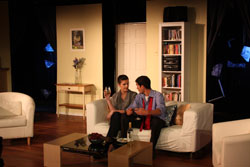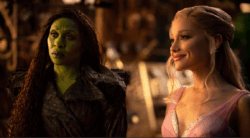From its opening scene, you might expect Rabbit Hole, Mask & Bauble’s latest production, to be the stage version of a gender-reversed Knocked Up. Izzie, a carefree woman-child clad in a Beatles t-shirt and skinny jeans, recounts her most recent bar fight to Becca, her tightly-wound older sister. After Becca gives her a verbal slap on the wrist for profanity and some motherly chiding about her partying lifestyle, Izzie reveals the reason for her alcohol-fueled altercation—she is pregnant by the woman’s boyfriend.
But that’s all the comic relief you’ll find in Rabbit Hole—at the scene’s end the real premise of this heavy, emotional drama comes to light. Becca Corbett, the pinnacle of the Westchester stay-at-home domestic goddess, and her broker-bondsman husband have suffered a loss that uprooted their picturesque suburban life—their only son, four-year-old Danny, was killed in a car accident. The script, which won a Pulitzer Prize for playwright David Lindsay-Abaire and was recently adapted into a film starring Nicole Kidman, begins in medias res, eight months after the accident, and beautifully explores the persistent nature of grief in the lives of the Corbetts and their relations.
Rabbit Hole is an interesting choice for Mask & Bauble. For a predominantly college-age audience, it can be difficult to relate to the emotional struggles of a high-strung housewife and her rage- addled husband. And despite the best efforts of the cast and crew, the overall performance falls short of the powerful script’s potential.

The most glaring disservice to Rabbit Hole’s script is the performance’s pervasive lack of nuance. Stemming possibly from an attempt to compensate for the audience’s emotional distance, many aspects of the production are exaggerated to the point that they lose the potency of Lindsay-Abaire’s script. Becca, played by Sarah McMahon (COL ’12), is supposed to be proper and controlling, but her over- pronunciation of every word becomes tedious and comes off as forced. In a contrived contrast, the audience first meets Howie (Matt Lai, COL ’11) in an unbuttoned shirt and undone tie, sprawled on the couch with his legs spread—the couple’s dynamic all but slaps the audience in the face.
The play’s other characters suffer from a similar malady. Becca’s mother, played by Sasha Wilson (COL ‘11), is delightfully old and creaky, but her false accent distracts and confuses—is she Jewish? Long Islander? Midwestern? Izzie (Francesca Pazniokas, COL ’11) is the show’s clear highlight—complicated and grief-stricken, with her well-timed sarcasm alternating with genuine concern and fierce sisterly loyalty is one of the play’s high points.
Further redemption comes from the play’s technical merit. The set is superbly designed and crafted, making it highly effective—a three-room spread inside the Corbett’s house, each room impeccably decorated in true suburban yuppie fashion, from the faux grapes on the coffee table of the yellow living room to the robot sheets on Danny’s child-sized bed. Unfortunately, another confusing and decidedly unsubtle element mars the otherwise flawless set—exposed curtains, seen through doors and gaps in the walls, are hung with shattered glass, frames, and pictures of small children. These don’t add to the emotional value of the show, but they do prove distracting.
And in a show like Rabbit Hole, distraction is exactly what the Georgetown audience does not need. It makes it difficult to delve into the emotional trenches of this strained marriage. Maybe Mask & Bauble would do better restaging it ten years from now, once we’ve grown up into middle-aged suburban homeowners.
Rabbit Hole runs in Poulton Hall from Thursday, March 31, through Saturday, April 9.





Gender reversed Knocked Up? What kind of clown do you have writing for the Voice? Leigh Finnegan obviously lives in a world of fantasy and frivolity. She needs to grow up and sooner than 10 years from now. Congratulations to the entire cast for bringing to light a brilliant existential take on human emotion when faced with adversity. Congratulations to the majority of Georgetown University students who are grown up and mature already. The only \distraction\ here is Leigh Finnegan with her superficial nature enthralled by faux grapes and suburban yuppie fashion.
Examining whether the choice of “Rabbit Hole” is appropriate for a mature, profound college population such as Georgetown’s is not the issue here. Perhaps Leigh Finnegan should stick to reviewing productions more appropriate to her level of maturity, say “High School Musical,” with musical accompaniment such as “Girls Just Want to Have Fun.”
It would seem the reviewer missed the director’s desire to confront society with the opportunity to delve deeply into the nature of loss — something all humans face during a lifetime. Georgetown’s mission and motto deal with developing the whole person and preparing that person to serve society. I congratulate this director, his cast and crew for demonstrating the Georgetown mission by providing such a well constructed means of self-reflection, catharsis, growth, and empathy.
What an artistic eye the director has! The set design beautifully echoes the contrasts of emotion expressed so professionally by the actors. Sarah McMahon and Matt Lai excel in their demonstration of the polar consequences of such a profound loss. The cohesiveness of the cast and all aspects of the set, sound, and lighting design draws the audience into the very depths of their crisis. Fast paced and hard hitting, this piece leaves the audience breathless, contemplative and determined to go home and express love to significant others.
Congratulations to the director, producer, cast and crew of “Rabbit Hole!”
So I can absolutely understand that, at a first glance, Rabbit Hole may seem like a deep, “mature” play for a college-level audience… but let’s face it. Matt Lai and Sarah McMahon delivered a brilliant performance, and the only way that they “slapped the audience in the face” was with how well they were able to capture the emotions of a couple who had just lost a child.
Francesca Pazniokas was also superb in her portrayal of Izzie. Absolutely wonderful and witty and funny- and I’m glad that this review at least recognized that.
Also, if the only thing that could be said about Sasha Wilson’s acting is that you couldn’t tell where her accent was from, WOW, Leigh Finnegan. WOW. You clearly couldn’t feel a good play if it slapped YOU in the face.
To everyone involved with Rabbit Hole, I thought it was phenomenally done, and I thank you for bringing such a play to Georgetown. I know that I’ll certainly be telling all of my friends to go and see it. And to anyone who reads this review and decides not to go, read the Hoya instead.
Most glaring mistake in this already questionable and prejudiced review: not mentioning the guy who played Jason. At all. In a play of only five characters you can’t even manage to mention the one that drives the *entire* plot? He had arguably the toughest role, and he did a damn fine job.